Social Media Profiles: A Faithful Reminder of Who We Are, and Who We Can’t Be
“Being someone is all very well for smart parties where everyone is telling their story, it’s all very well for psychologists’ consulting rooms. But isn’t being someone also a social obligation which trails in its wake- for one has to be faithful to the self-portrait- a stupid and burdensome fiction?” -Frederic Gros.
How easy is it to be free when one is constrained by their own identity?
Identity as it is often understood is a performance. The way we perceive and are perceived in social settings vastly shapes the way we interact and understand the world. There is a constant interplay between our mask that we show society, and our ‘inner’ selves. In fact, this performance has been such a topic of inquiry through human history. One mode of coming to terms with identity is creating it, thus you have the birth of the portrait. Portraits exist in numerous ways across different cultures, depending on the cultures own view of identity. These portraits manifest in a wide range of examples such as, DNA, masks, photographs or conventionally, paintings. This article is concerned with a modern phenomenon, the social media profile (portrait).

A Brief Background on Identity and Portraiture
We create identities for ourselves constantly. The history of human portraiture has shown a wide range of ways we have viewed ourselves in relation to others. This progression constantly changes and evolves. It was not long ago when the most important factor of a wealthy individual in the western world was their name. In the past numerous portrait paintings were commissioned by wealthy Aristocratic families. Whilst there may have been disputes over how the individual looked like in the painting, the central aspect of importance, the thing that identified them, was there name in caption below the work. The inclusion of land acquisitions and wealth was just another aspect pertaining to their identity.

Most people on the periphery, peasants, the poor, were part of the masses, nameless. As human life has come to be seen as more valued and time and history progressed so too does our understanding of identity. It has shifted from family names and estates to now encompassing individuals. Soon portraits of your average peasant were a common site, later on photographs of an average family. Nowadays we have the social media profile.
The Social Media Portrait
A social media profile can be viewed as part of the natural progression of the history of portraiture. In our present day portraiture has evolved from paintings and headdresses. Identity has now entered the age of the internet. Look to any single individual and they may have several different profiles each testifying to how they interact and exist in the world, at least the online world. Each social media website is slightly different in terms of what their product is and how they want you to navigate, we could say they express different cultures. The way one interacts on one site such as Facebook may be completely different to their profile on Instagram. These virtual worlds possess room in which an individual can testify to who they are, what are their values and in a sense what makes them, them. No longer is it just a name, there is images, videos, sound recordings or wall statuses. This conglomerate of profiles each attempt to meet at the centre and express an entire history of you. This is a history that is constantly updating and evolving.
Identity is understood in relationship to history. Looking to the way identities act as social constructs bears witness to the way these societies understand themselves. In many western societies identity is centred more around the individual whilst in other regions of the world, identity is strongly rooted in the community you come from. These identity beliefs are cross cultural and differ widely. Now as identity has moved towards the internet these identity beliefs have become globalised and international. People now understand their own identity in relation to a much larger community than was seen in the past. Human beings interacting in one part of the globe are made aware of their own identity in relation to others in another part. We can thank social media for this incredibly connected phenomenon.
An Identity, A Fiction
If identity is understood in relation to history, what is the history presented by our social media websites? It is an immense cloud of information from photos, to wall posts and even sound recordings, each testifying that this is you. People can gather a lot of information about themselves and others from these shared histories to the point where they understand them as realities. As much as this seems the case, isn’t it also a fiction? In Charles Cooley’s looking glass self theory, he concluded that people shape their self concepts on the way others perceive them. We become ourselves through society rather than having an innate sense of self. A profile acts as a constant reminder of the world looking back at you. Identity is constructed through society to the point where it is often fictitious.

This history of you, your social media profile, follows you. No matter where you are on the globe, you can tap into your Facebook feed and be reminded about who you are, where you came from, and what you are interested in. Susan Sontag once said on photography, “today everything exists to end on a photograph”, now everything exists to end on our wall feed. Social media profiles are allowed to grow and evolve with the movements of your own life. By creating narratives through photos and wall posts we construct identities of ourselves. The power of social media has shown to be incredibly valuable for connecting with people around the globe and finding people you may have forgotten about years before. These social media identities have become a huge importance on our daily lives.
With that being said, isn’t an identity also a burden? It is often a romanticised view to go out in the world, get lost, construct yourself anew. Is this still the case with a social media profile of you trailing in its wake? As much as we perform our identities , our identities also inform us in how we act. In that sense it is hard to construct yourself anew whilst being constantly reminded about who you are. Facebook recently began showing past wall posts allowing you to be reminded of what you were like then, or who you were with. Not to mention being able to see friendships or what your relationships were like with other people. Now new job managers may want to look at your profile to get a sense of who you are. Your past acts a constant reminder on your daily life to the point where it can become more debilitating than pleasant. With your identity on display constantly, viewed by your peers or the professional world, how easy is it to construct yourself anew, to get lost?
The value of social media in our day and age has become increasingly apparent. It has acted like a new form of portraiture. Like all portraits, people want to stay faithful to them, to be reminded about who they are. The problem comes down to how immensely vast these portraits become. They grow and evolve with you, people understand them to be realities. The narratives these profiles profess are also incomplete and often superficial. Being yourself can sometimes be a burden, but being someone else, or someone new, is now much harder than it was before. Our relationships supersede the superficiality of social media and the internet, however, now they are sometimes the only ways we can remember people or even ourselves. It would be naive to think of a world without social media, but it would be nice to be able to think of someone without being reminded of the thousands of other things going on in the world. Like most things in the world, there are good points and bad and we have the choice to choose. Now with social media, our ability to choose who we want to be, is left up to Facebook or Instagram, and the list goes on…
What do you think? Leave a comment.


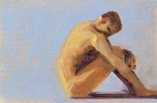

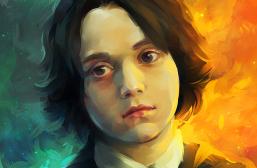

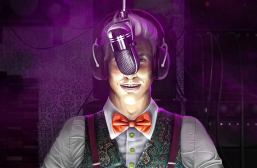
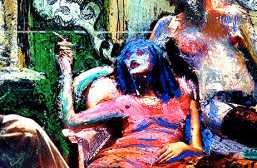
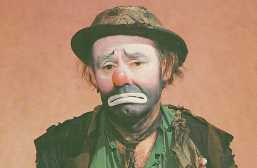


Awesome article dude. While I don’t see social media as necessarily evil, there is no doubt that is consumes of daily life. While people can easily get addicted to Facebook or Twitter, I helped us keep in touch with people that we may never see as much. It is certainly a double edged sword.
It certainly can be a double-edged sword, considering anyone can track an individual’s daily routines. That can be potentially dangerous.
Coltrane, you created an interesting article on identity and the use of social media as a tool to construct ones sense of self. As one experiences life new encounters manifest; a deconstruction of that identity can take place; a rebirth if you will allowing for restructuring of a new portrait- with an audience bearing witness.
for the most part, we are online the true versions of our offline self…
Great good for thought. Do our attitudes to ‘real’ and ‘virtual’ reputations really diverge? If so, how and why?
Hi, while I definitely see a close resemblance to our real and virtual selves, I see a gap because our virtual selves are structured on monocultural level. We can express our individuality but then it is still based on a structure that has been put in place by someone else or a company. Our ‘real’ selves are also in a sense structured by outer influences in society, I guess it becomes more apparent or visible when observing our virtual selves. Maybe our attitudes to both don’t diverge necessarily , we can just observe our virtual selves more clearly.
The internet can be a weirdo’s paradise but I think most people are pretty honest.
I deleted my Facebook account because I am just not comfortable with the level of privacy invasion or the degree to which so-called “friends” can cross all social boundaries, posting any sort of picture or information about you for all other social acquaintances of any kind to digest.
I really enjoyed this article. I think there are some very valuable points here, even if it is a bit waffly.
At times the perception other identities have of you is so off the wall it’s hilarious which is why the internet will never trump real life, at least not for me.
I really dislike social media, however, many work places sort of ask (aham, demand, of you to have a profile somewhere). I deleted my FB account and had to create a new one because I write for an online magazine and that’s how most people who work for the mag interact. All in all I don’t post anything there because it does feel like too much of a violation of the private. They only social media I do check on a more or less regular basis is Instagram because I follow several Korean celebs, but that’s pretty much it. Social networks are good for those who want to promote themselves or their products.
Several studies showed that the more people engage with social media the more depressed they become… Sad but true. Great article.
Engaging article, very well thought out. I do believe though, with regard to your last paragraph, that the people we do remember without the help of social media are the only people really worth remembering. I totally agree with the idea that, as we change and grow, so do our media versions of ourselves. The older I get, the less I care about updating facebook profiles, as it is not how I validate myself as a person (anymore). The integration of social media into society is inevitable, but it’s up to people like us – who have developed an awareness of separating the online from reality – to help others form this awareness as well.
In the type of work that I do, I have to curate my online persona really carefully. No longer is self-googling a narcissistic act. What appears when someone googles my name is something I monitor very closely. Who knows who is searching my name today? My children? A future employer? My mother-in-law?
I know people who online portray themselves differently than I know them to be in person. They Tweet things that they think their followers are interested in and write blogs on what they thing they should write rather than what they want to write. Consciousy or unconsciously, who knows.
Maybe the whole Internet is becoming a place of augmented reality now rather than being reserved to sites like Second Life. The worrying part is when people can’t distinguish between the two.. Entering the third life?
I found it an enjoyable and interesting article.
With the power to upload whatever you want, it’s easy to create a different persona than in real-life. Have you seen Catfish? Now people can just take another person’s photos and pretend that’s them.
It’s crazy, but that’s why I choose what I want to put on my Facebook, Instagram and Twitter accounts. You can’t assume you know a person based of what you see in their social media, but it’s fun to see what people are up to.
I actually consider myself a “Facebook addict” because I am in quite a lot of discussion-related Facebook groups and I’ve learned quite a lot from them. But if a person tries to be another person, be it a real person or fictional one, it could mean that the person is not satisfied with or even hate his/her own identity. I think that’s where the problem is. I don’t see why a person would want to be anyone else if the person is totally happy with himself/herself.
This is a great topic. I’ve always believed that people social media presence is loss a sign of who they are but rather who they want you to think they are. As well all know, we are not the people online that we are in our lives. Sometimes more, sometimes less, sometimes not at all…ie, catfish. But we are connected in a way that we never have been before. You can google almost anyone you meet and find something of them existing somewhere online.
The internet is a great way to lose, discover, project, and created oneself these days. But eventually we have to leave our houses and then were just the same person we always were before.
I wonder where that free world was where you could construct other identities. I never found it.
A thought-provoking article, thank you for the read.
Very interesting, a wide topic.
Social media allows one to frame themselves as who they want to be – not necessarily who they actually are. Very insightful read.
Firstly, I love the idea behind this article and it opens up a massive can of worms. I agree that social media distorts and/or refracts identity in an unprecedented way. Whether or not it is a bad thing is, most likely, yet to be seen, but it will have to be something we have to adapt to. I do not think there is a choice in a completely unrestricted sense. If one wants to succeed or even be seen in this ever-growing, both in terms of population and in terms of the voices and the multiple ways these voices can be “amplified”, they need to use social media and, I think, portray something which is not an identity, but an exaggerated version of themselves. However, inevitably, this creates an endless sort of loop where the person has to change their identity to better fit this persona. Hopefully, this does not narrow identities into the future, but instead allows more diversity. Once again, a brilliant article.
Great piece. Very interesting read.
We are in control and we are responsible for what we publish about ourselves online.
This was a pretty great read! I thought a lot of your points were quite salient. Have you looked into the work of Joshua Meyrowitz? Meyrowitz works with some ideas about technology and how society uses it presented by Marshall Mcluhan, and Erving Goffman’s ideas about social identity. Meyrowitz work was postulated before the advent of the Internet, but when coupled with Social geography, I think there’s a lot of potential to explore your ideas through these lenses.
Coming from that background, I’m left with some questions, but chief among them is this. Would you consider social media identity creation to be different than how we facilitate different facades for different people? Wouldn’t our personas online just be best seen as what we consider to be the lowest common denominator of self? The self we think is consistent across all the different personas we create for all the people in our lives?
Either way, this was a wonderful read and well written, so thank you!
Really great read and relevant to our contemporary culture today. It’s interesting to think about our social media profiles as portraits that are constantly evolving because it’s true! It also makes me think of how people would dress up, pose a certain way, look a certain way, etc. when taking photographs, and our social media profiles are the same. We select certain images, share certain posts, edit our content so that it reflects a certain idea of how we want to represent ourselves to others.
A quote that comes to mind is, “Stop comparing your behind-the-scenes to everyone’s highlight reel”. We usually choose to present the best side of ourselves on social media, and when we look through these websites, we’re often alone and internalizing the content, so the way we interact with these sites creates an interesting dynamic on how we see ourselves and others.
Great article. Social media and the impacts it has on a persons lifestyle and identity is something that is very intriguing to me and you brought up a lot of aspects to think about!
Online identity can be seen as a better version of the people we wish we were. We project what we want others to see. Everyone likes the idea of being “unique”, getting attention. Through interesting posts, we grab attention, and it is intoxicating. I really enjoyed the way this article presented online identity as a history. Understanding it this way validates the dedication at which we post and update our online profiles.
Usually online I’m more outspoken, but I’m like “Ah, I’m sorry…” irl XD
Intriguing article.
Reading anything about art history feels as if most artistic ventures are totally narcissistic, especially related to self-portraits. But really, moving into the 21st century has made it absurdly clear how ridiculous being so self-absorbed is. Identity is a burden, but I feel like in the world of digital media, we are all part of an identity, rather than being individualized anymore. When I look at a photo someone took of themselves on a phone, it’s not just their photo, it is mine as well, I see something in it that I can relate to and despise simultaneously. Coltrane93, where do you see self-portraits going in the future? Will it become so inundated with selfies, or will the real value of being ALONE prevail?
Social media is a means for some people to create an identity for themselves when they don’t have a voice in their own real world experiences. Some people put their experience to good use and talk about it on social media to educate others not to make some of the mistakes they have made or not able to talk about an issue out loud but able to freely express their opinions online with a private name of their own creation.
People are often very selective when determining their social media profile. People want to create a reputation for themselves, they want to display the best posts to reflect themselves. Once the reputation is made people feel the need to maintain it, almost like a second job. The article brings forward some great points, however there were no statistics and it was very opinion based.
Social media has taken over our lives. A lot of people put there experiences to educate others and as well as to let them know what mistakes not to make. At the same time, it has an negative impact to it. It influences our lives in variety of ways.
Social media for many people is a little like Intro to PR, they learn to become their own publicist, see what gets them the most positive attention (and also negative) seek validation, manage crises, and the whole nine.
I like the structure of how you were able to show the evolution of how society has placed importance of things of less importance; to becoming the main social concern of now. I also agree to the way in which people must be aware of this persona, the importance but also understanding that is not the only thing. I also was extremely interested in the examples such as the relation to the importance of your name, as well as The examples of Facebook and any type of social site.
Your observation on how people interact differently on different websites is so true; I was discussing it with a friend the other day, we were discussing Instagram etiquette. Now that I write it out and look at it in hindsight, that is such a bizarre topic to be the subject of a serious conversation – although, being able to have such a finely tuned radar on etiquette is something everyone seems to lack in real life. Perhaps this could open the door to expressions of more appropriate behaviour in the offline world…
Good read. It can certainly be difficult to construct new paths or identities with a record of past posts, pictures, interactions, etc. Identity is extremely complicated, as is social media because, despite the history, one can also construct different personas depending on the site and expectations, as well as how reactions differ on various sites. One may be more restrained on what they share on Facebook than on Twitter or Instsgram. It depends on the individual. And a lot of social media is so new that it’s hard to discern just yet.
Over a year late, but great article! The links between portrait representation and social media were rather interesting to read about.
You speak of the different personalities projected on different platforms (varying according to the purpose/features of the platform itself). I was wondering how this same phenomenon would figure if thought in context of the breaking out from the idea of one uniform singular identity for each person, and the more modernist idea of a multiplicity that makes up each person?
And also, would this multiplicity at all count, if one considers the ‘reality’ or ‘authenticity’ of a social media account?
Once again, amazing article 🙂
I enjoy sharing a little part of my life with people on social media – but the key concept for me is that it is a little part of my life. I do not upload to Instagram daily or even weekly. Maybe a month goes by, because I don’t have anything that I feel like sharing. So, my online profile is not a reality. It is a tiny snippet of things that I’ve experienced. In using social media this way, I then assume that other people use it similarly and the people I follow on Instagram have a lot more to them than what makes up their profile.
In terms of constructing yourself anew, I think that even in this process you carry traces of past experiences with you but that doesn’t mean you have to be attached to it so that it becomes a burden. Everything you have done before now informs your present – you learn from mistakes and avoid repeating them, but you also learn from success and enjoyment so that it can be replicated, developed and continued.
So then maybe it isn’t social media that’s the issue, but the way we use it.